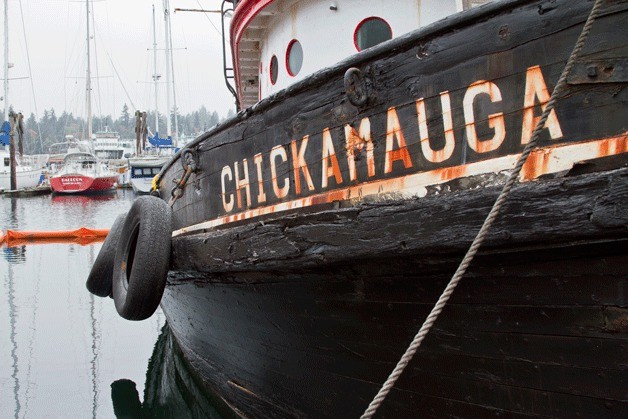The historic tugboat “Chickamauga,” which sank in its mooring early Wednesday, Oct. 2, at the Eagle Harbor Marina, has been raised to the surface and the pollutants it spilled have been properly cleaned. The salvage company Global Diving & Salvage, under contract to the Coast Guard, did manage to raise the vessel to the surface and stabilize the boat.
That’s as far as things have gone.
“Nothing has changed,” said Harbormaster Doug Crow. “It is floating and it is off the ground and it appears to be floating fine.”
Due to legal issues surrounding the ownership of the boat, the Coast Guard contractor was unable to facilitate the moving of the derelict vessel.
“We don’t have the authority to turn it over to somebody to tow it or salvage it because we don’t have the owner’s permission,” Crow said.
Crow confirmed the identity of the vessel’s owner as one Anthony Smith, but maintains that inconsistencies in the vessel’s paperwork make it impossible to be certain of even that basic fact for the time being.
“According to my records it is Anthony Smith,” Crow said. “But when we check documentation records it does not show that. It shows somebody else.”
The as-yet-unreleased second name may be the former owner of the vessel, according to Crow. Smith may have simply not updated all of the boat’s paperwork.
“Did he buy the boat and not change the documentation? I don’t know,” Crow said. “I was under the impression he had owned the boat for some time. I still have not heard from him.”
Crow went on to say that the harbor insurance policy would pay for the removal of the boat, if only the owner would give them written authority to take possession of the vessel.
“He’s up in Alaska,” Crow said. “He’s a tender captain up there at a cannery. He won’t return any calls, just nothing. He returned calls to the Coast Guard, but would not return them to the marina.”
The issue has then been turned over to the marina’s lawyers, according to Crow.
“Our attorney’s are in the process of getting whatever needs done,” Crow said. “Our insurance company will have it towed or put it on a barge and haul it away. All he has to say is ‘I’ll turn the boat over to you guys.’ The Coast Guard won’t do it.”
Crow went on to say how frustrated he has become with the process.
“It’s just about impossible to get rid of a derelict boat,” he said. “I’ve been trying to get this done since April.”
According to Crow, the boat’s owner filed an application in February for a slip in the marina with photos of the boat which did not accurately reflect its poor condition.
Having paid for only two months, the owner brought the vessel in at night and had not been seen by Crow since, he said.
A Coast Guard spokesperson from the Incident Management Division confirmed that the boat is no longer an environmental hazard, and the response actions have successfully been completed.
Though the boat is no longer a danger to the environment, there remains the question of who exactly is responsible for the money spent on the incident clean up.
Coast Guard spokesperson Mike Sarniak, a marine science technician with Sector Puget Sound, confirmed the total cost of clean up efforts following the sinking of the tug is currently $150,000.
The efforts have been financed by money available through the Oil Spill Liability Trust Fund, which exists for just such incidents and is itself funded through a standard tax placed on every barrel of oil sold in the country, according to Sarniak.



